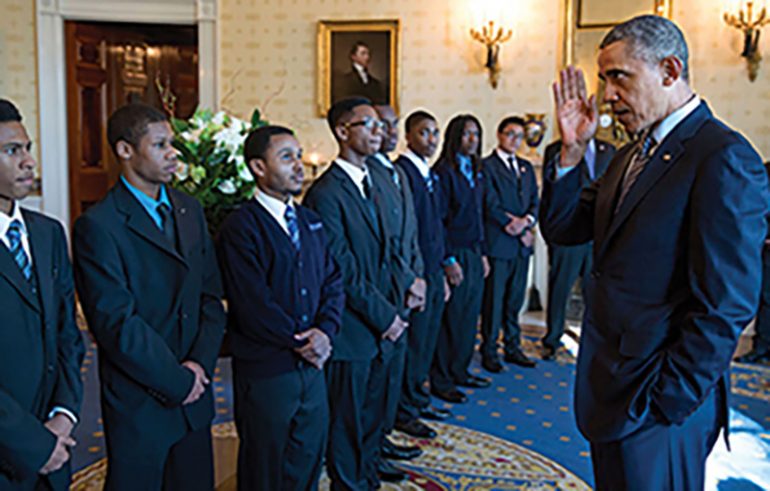Black parents have a conversation with their children, especially their sons, that has become known as “The Talk.” It is about how to handle encounters with the police to insure the ultimate positive outcome, which for young Black men, means staying alive.
“The Talk” is kind of like the rules of the road on how to deal with policemen, particularly White policemen, as Black youth are beginning to enter the world by themselves or with their teen friends.
“The Talk” is a conversation intended to show children how to navigate the situation of encounters with the police when their parents are not present, or even when they are. “The Talk” is a rites of passage ritual.
“The Talk” usually comes particularly when the kid gets a driver’s license, or when the youth is about to enter college, or when the child enters the stage of going to the party just with friends and without parents.
All parents should have “The Talk” with all of their children, be they male or female. This is an essential conversation for Black male teens, when they are at their most vulnerable stage. It is a way of handling confrontation conversation, an introduction into Real World 101. The points brought up in this conversation might be life saving as your kid might be in life threatening situations. Some think this is a pacifying conversation, I think it is a necessary one, that could determine your existence.
Cops And Robbers

One Black father compares being stopped by the police similarly to being approached by an armed robber and suggests your behavior should be the same in both scenarios.
In both cases, the father contends, you are being stopped by an individual you don’t know who is carrying a weapon that can kill you. Both situations involve brief but intense encounters and the wrong behavior can get you killed.
In a robbery, you’re always taught to put your hands up, listen to the robber, do what he says. Hand over whatever he asks for – your money, your jewelry, your electronics, your car. If you’re reaching for your wallet in your pocket, do it slowly. Make no sudden moves. Curb your attitude. Do not be defiant. Speak slowly in a low voice. Do not look directly away, but do not make continued direct eye contact.
Give him what he wants the way he demands it; by complying with him, hopefully the ordeal will be over soon and safely. You may be shaken, but at least you’re still alive and unharmed. As the saying goes, whatever material things you give up in a robbery can be replaced and is not worth losing your life over.
“The Talk” is to let children know that there are ways and behaviors that can be used to avoid being harmed or killed by the police.
It’s the same with police encounters, this father says. You are dealing with an armed individual who doesn’t know you, but has stopped you, and can kill you depending on your behavior.
You must treat him or her like the armed robber – doing whatever they say. Do it slowly, no sudden motions. Always keep your hands out and in plain sight. Do not display an attitude. Even if you are arrested, go peacefully. If this is your behavior, you will almost never be killed or harmed by the police.
A problem that comes in, this father says, is that many young people consider adopting this kind of behavior when dealing with the police as “being a punk” and they most assuredly will tell you, “I ain’t no punk.”
Well chances are they most certainly are going to be a punk when looking down the barrel of the robber’s gun. There’s not going to be too much lip given or macho behavior adopted during that particular moment in time. They may get all swole up again after the robbery, but at that instant pretty much all they’re going to do is hand it over, figuring instinctively the odds are pretty good they’ll get their heads blown off if they don’t.
They don’t think a policeman would do the same thing, but you never know a person’s thoughts, feelings or motivation at a particular moment and when that person has the power to kill you in the confrontation you’re having with them, it’s best not to agitate them or aggravate the situation.
“The Talk” is to get children to realize this, to let them know they may have to swallow their pride in dealing with police, but at least they’ll be alive to swallow something else another day. The point of “The Talk” is to let children know that there are ways and behaviors that can be used to avoid being harmed or killed by the police.
A Dozen Rules To Not Die By
“The Talk” is not an exclusive conversation. Different parents might tell you different things, but mostly these are some of the important guidelines that you can use in your discussion with your children.
- Policemen are afraid of you. If you are a young Black male, assume that police are afraid of you. Do nothing to excite the fear. Do not put your hands in your pocket as the officer addresses you. Keep your hands up, in full view, so the officer can see them. Make no awkward, funny moves.
- The police, particularly White police officers, do not care about your occupation, your education, your family heritage, where you are going or who you know. YOU MAY HAVE BEEN STOPPED JUST BECA– USE YOU ARE A BLACK PERSON, and you never know what is going on in the mind of the individual policeman who has stopped you at the time.
Particularly if he or she is a White police officer, they may have racial motivations and prejudices. They may be power tripping. But they are in control and they have the ability to harm or kill you. Keep in mind, the police person has the gun, not you.
- Be polite at all times. Your language and tone at the time you have been stopped by policemen will convey a lot to them. Be polite. “Yes Sir” or “ No Sir” are in order. Ask the officer politely why you are being stopped. Note the officer’s name and badge number mentally. But do not curse or speak loudly. Speak slowly and lower your voice.
- Watch your reach. If the officer asks you for documents that are in your glove compartment or in your pocket or in your purse, ask the officer if you can get them. Better yet, ask the officer if he would like to get the documents, and then allow him to go into your glove compartment or purse.
- If you are stopped on an isolated street, try to drive to a busy area so that people can see you and the officer. But get permission to do so from the officer first, so the officer doesn’t think you are trying to elude him/her.
- Some officers tell you to get out of the car; some tell you to stay put. Let the officer direct you as to what you do. If you want to get out of your car, ask the officer first for permission to do so.
- Appearance matters. Be aware of what you are wearing. If you have on a hoodie, t-shirt and jeans, caps and athletic clothing, you stand a higher risk of being stopped by the police. It is called profiling. Rightly or wrongly, this type of dress is considered thug attire by the police and will sometimes cause them to address you in a less polite manner than if you are wearing khakis, a button-down shirt and tie or a suit. Note the clothes the people who have been killed by the police. I have a doctor friend, who is a brain surgeon. He is a black man. He wears his hospital clothing, “scrubs” to and from work in the car. He is a big guy and he says it keeps down a lot of confusion.
- Kids in a crowded car are highly prone to being pulled over by police, particularly if loud music is playing. Beware.
- Once stopped by police, do not reach for your phone if it is in your pocket or purse. But if you do have the phone out, try to tape the encounter.
- If the officer is going to write you a ticket, you might want to suggest driving to the station for him/her to do so, rather than writing it on the street.
- Whatever you are cited for, calmly take the ticket. Do not argue about it. Do not be afraid of taking a ticket and do not display outward aggravation. Better to get the ticket that you can go to court to contest rather than being in the morgue.
- Know a lawyer. Keep the number of a lawyer you can call in case things go foul when you’re stopped so that you can have good fast legal advice. Even if you survive the police encounter, once you’re arrested and in the criminal justice system, you can be damaged in other ways. A lawyer can help you. And always call your parents or a family member as soon as you are allowed to check on your well-being, because you can also be found dead in a jail cell.






